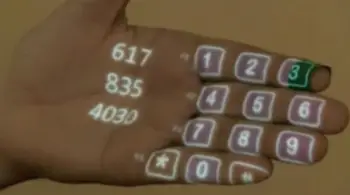
Google Glass Laser Keyboard: will it further fuel patent wars?
At CES 2013, I showed you the crazy eyesight controlled computer that could become a Google Glass partner. Many of you had your doubts, but as we reported yesterday, a recently filed patent by Google illustrates some of the exact functionality we predicted Tobii could bring to Glass.
Look at your hand. Dialpad beams onto it. Press your hand. Number dialed. What the heck just happened?
The functionality is a little bit different from Tobii because rather than tracking your eyes and correlating eye movement with a pressed button, Google Glass already knows where your eyes are looking because the glasses are pointed in that direction. But note number 304 where you’re visually seeing the display? Looks familiar.
Combine the technology that’s already working brilliantly in the Tobii display with the concept shown above and Google Glass could have something really interesting in store for us all. While the Glass possibilities are undoubtedly marvel, how do you activate all the ideas app developers could initiate? Do you need to provide voice commands? Will your phone be a remote control for them? What’s the deal? This type of interaction could solve that problem.
But this concept isn’t new as pointed out by Devin Coldewey of NBCNews Digital.
Above, you can see a 2009 video from TED discussing SixthSense technology. Last year, Microsoft showed off an eerily similar Kinect-ish concept that makes everything a touch screen. First let’s take a look at a screenshot from the SixthSense video shown two years ago:
Now how about Microsoft’s rendition from last year?
Uhoh, I can see where this is headed: patent court U-S-A. That being said, Google’s variation mounts the laserto a pair of glasses, cooperates with a glasses-mounted camera, and possibly incorporates eye-tracking technology (among other tech) to efficiently process user interactions. Crazy stuff.
Although the first Google Glass developer event is right around the corner, incorporating consumer-ready technology found in this patent isn’t likely within the next couple years. And therein lies the patent race debacle: if these glasses and this technology becomes popular, what parts of which patents are valid or first or overlapping? By the time these products generate corporate profits (if they do), the string of related patents will be so confusing that… well, things will seem like they haven’t changed.
I think it’s about that time. Time to start thinking of futuristic movie ideas and, instead of writing a screenplay, file patents based on that imaginary movie in hopes that someone else will one day try to patent it. On the contrary: the awesome, crazy, and exciting thing about Google is that, whereas other companies leave these ideas on the shelf as futuristic “concepts”, Google is actually making them a reality.